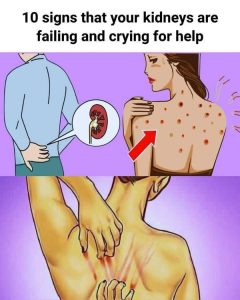Your kidneys are essential organs that work quietly in the background to keep your body running smoothly. They filter out waste products from your blood, regulate fluid balance, manage electrolytes, and help control blood pressure. Despite their vital role, kidney issues often go unnoticed until they reach more serious stages. That’s why understanding the early warning signs of kidney disease is so important. Catching these symptoms early can make all the difference in protecting your long-term health.

One of the most common early signs of kidney problems is fatigue. When your kidneys are no longer filtering waste effectively, toxins build up in your bloodstream. This can leave you feeling constantly tired, sluggish, and even mentally foggy. You might have trouble focusing or find it harder to complete everyday tasks. In many cases, this fatigue is linked to anemia, a condition that often accompanies kidney disease due to reduced production of a hormone called erythropoietin. This hormone helps your body make red blood cells, and without enough of them, your energy levels can plummet.
Sleep problems are another indicator that something might be wrong with your kidneys. People with declining kidney function often struggle to get restful sleep. The buildup of toxins in the blood can make it harder to fall asleep or stay asleep through the night. Sleep apnea—a condition where breathing repeatedly stops and starts during sleep—is also more common in individuals with kidney disease. This can leave you feeling exhausted during the day even if you spent a full night in bed.
Another telltale sign is dry, itchy skin. Your kidneys play a key role in maintaining the right balance of minerals and nutrients in your body. When they’re not working properly, you may notice your skin becoming dry or irritated. This can be an early indicator of mineral and bone disorders that are associated with kidney disease. These conditions arise when imbalances in calcium and phosphorus begin to affect your skin and bones.
Needing to urinate more frequently—especially at night—is another symptom that shouldn’t be ignored. When the kidney’s filtering system becomes damaged, it can lead to an increase in urine production. While more frequent urination can be caused by other health issues like diabetes or urinary tract infections, it’s also a red flag for early-stage kidney disease.
Seeing blood in your urine can be alarming—and it should be. Healthy kidneys typically prevent blood cells from leaking into the urine. When this happens, it could be due to damage in the kidney’s filtering units. While blood in the urine might also be linked to infections or kidney stones, it should always be evaluated by a doctor, as it could indicate a more serious problem.
Foamy or bubbly urine is another sign that protein may be leaking into your urine. This foam might resemble the bubbles you see when scrambling eggs, and it’s a sign that your kidneys aren’t doing their job properly. Normally, protein should remain in your bloodstream, so if it’s ending up in your urine, that’s a warning sign.
Swelling in the lower parts of your body, particularly in your feet and ankles, could be related to kidney trouble as well. When the kidneys fail to eliminate excess sodium effectively, the result can be fluid retention. This leads to noticeable swelling in the legs, ankles, feet, and sometimes even the hands. If you find your shoes or socks are leaving deeper imprints than usual, it’s worth discussing with your doctor.
A reduced appetite may not seem like a big deal, but when paired with other symptoms, it can be another sign of trouble. As waste builds up in the body, it can alter your sense of taste, reduce your desire to eat, and even cause nausea. This can lead to unintended weight loss and poor nutrition over time.
Muscle cramps are another discomfort that could be pointing to a deeper issue with your kidneys. Imbalances in electrolytes, such as low calcium or disrupted phosphorus levels, can trigger muscle contractions and spasms. These cramps often occur without warning and can be painful, especially at night.
Persistent puffiness around your eyes is something you shouldn’t overlook either. This can indicate that protein is leaking into your urine—a sign that your kidneys’ filters are not functioning properly. You might notice this puffiness even before other, more obvious symptoms appear. In fact, some people report swelling around the eyes long before they suspect anything else is wrong.
If you notice any of these signs—or especially a combination of them—it’s time to take action. Don’t wait until the condition becomes more advanced. Early intervention can make a huge difference in slowing or even halting the progression of kidney disease. Speak to your healthcare provider about your symptoms, and request lab tests to check your kidney function, such as measuring your creatinine levels, estimated glomerular filtration rate (eGFR), or checking for protein in your urine.
Fortunately, there are steps you can take to protect your kidneys and overall well-being. Staying well-hydrated helps your kidneys flush out toxins more effectively. Eating a balanced diet that’s low in processed foods, salt, and added sugars supports your kidneys and helps maintain a healthy weight. If you have conditions such as high blood pressure or diabetes, managing them through medication and lifestyle changes is essential, as these are leading causes of kidney disease. Regular exercise and avoiding excessive use of over-the-counter medications like NSAIDs (ibuprofen, naproxen) can also reduce your risk.
Kidney disease doesn’t always present itself with loud warning bells, but your body often sends subtle clues. Paying attention to these early symptoms and taking them seriously could prevent complications down the road. Your kidneys are quietly working every day to keep your body healthy—make sure you’re doing your part to return the favor.





